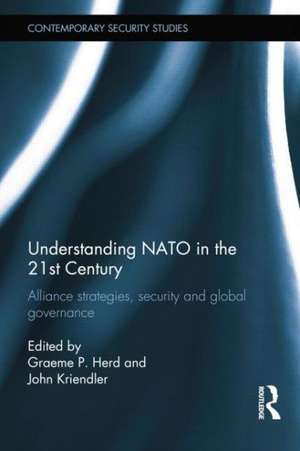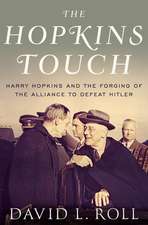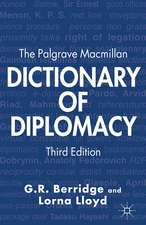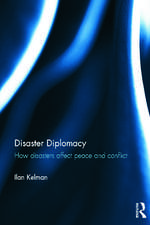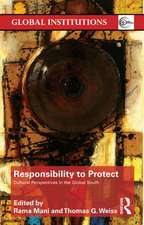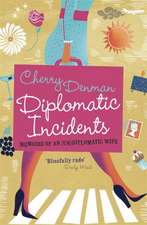Understanding NATO in the 21st Century: Alliance Strategies, Security and Global Governance: Contemporary Security Studies
Editat de Graeme P. Herd, John Kriendleren Limba Engleză Paperback – 12 sep 2014
The book seeks to identify the possible contours and trade-offs embedded within a potential third "Transatlantic Bargain" in the context of a U.S. strategic pivot in a "Pacific Century". To that end, it explores the internal adaptation of the Alliance, evaluates the assimilation of NATO's erstwhile adversaries, and provides a focus on NATO’s operational future and insights into the new threats NATO faces and its responses.
Each contribution follows a similar broad tripartite structure: an examination of the historical context in which the given issue or topic has evolved; an identification and characterization of key contemporary policy debates and drivers that shape current thinking; and, on that basis, a presentation of possible future strategic pathways or scenarios relating to the topic area.
This book will appeal to students of NATO, international security and international relations in general.
| Toate formatele și edițiile | Preț | Express |
|---|---|---|
| Paperback (1) | 415.24 lei 6-8 săpt. | |
| Taylor & Francis – 12 sep 2014 | 415.24 lei 6-8 săpt. | |
| Hardback (1) | 1054.97 lei 6-8 săpt. | |
| Taylor & Francis – 21 noi 2012 | 1054.97 lei 6-8 săpt. |
Din seria Contemporary Security Studies
-
 Preț: 312.00 lei
Preț: 312.00 lei -
 Preț: 341.95 lei
Preț: 341.95 lei - 9%
 Preț: 934.94 lei
Preț: 934.94 lei -
 Preț: 290.57 lei
Preț: 290.57 lei - 18%
 Preț: 1222.16 lei
Preț: 1222.16 lei - 18%
 Preț: 1227.03 lei
Preț: 1227.03 lei -
 Preț: 458.20 lei
Preț: 458.20 lei - 18%
 Preț: 1111.87 lei
Preț: 1111.87 lei - 16%
 Preț: 248.97 lei
Preț: 248.97 lei - 18%
 Preț: 1218.89 lei
Preț: 1218.89 lei - 18%
 Preț: 1058.79 lei
Preț: 1058.79 lei -
 Preț: 498.48 lei
Preț: 498.48 lei - 26%
 Preț: 1016.77 lei
Preț: 1016.77 lei - 18%
 Preț: 1062.98 lei
Preț: 1062.98 lei - 18%
 Preț: 1010.05 lei
Preț: 1010.05 lei - 18%
 Preț: 1054.97 lei
Preț: 1054.97 lei -
 Preț: 399.79 lei
Preț: 399.79 lei - 18%
 Preț: 1114.30 lei
Preț: 1114.30 lei - 18%
 Preț: 1113.25 lei
Preț: 1113.25 lei - 18%
 Preț: 1221.26 lei
Preț: 1221.26 lei - 18%
 Preț: 1059.84 lei
Preț: 1059.84 lei - 18%
 Preț: 707.96 lei
Preț: 707.96 lei - 18%
 Preț: 1055.84 lei
Preț: 1055.84 lei - 26%
 Preț: 821.10 lei
Preț: 821.10 lei - 18%
 Preț: 1061.06 lei
Preț: 1061.06 lei - 18%
 Preț: 1229.46 lei
Preț: 1229.46 lei -
 Preț: 385.54 lei
Preț: 385.54 lei - 18%
 Preț: 946.61 lei
Preț: 946.61 lei - 18%
 Preț: 1271.75 lei
Preț: 1271.75 lei - 18%
 Preț: 1057.57 lei
Preț: 1057.57 lei -
 Preț: 416.22 lei
Preț: 416.22 lei -
 Preț: 437.71 lei
Preț: 437.71 lei - 18%
 Preț: 1054.71 lei
Preț: 1054.71 lei -
 Preț: 409.31 lei
Preț: 409.31 lei - 18%
 Preț: 1170.14 lei
Preț: 1170.14 lei - 26%
 Preț: 849.84 lei
Preț: 849.84 lei - 18%
 Preț: 702.40 lei
Preț: 702.40 lei -
 Preț: 414.32 lei
Preț: 414.32 lei - 18%
 Preț: 1064.01 lei
Preț: 1064.01 lei - 18%
 Preț: 1061.93 lei
Preț: 1061.93 lei - 18%
 Preț: 1163.88 lei
Preț: 1163.88 lei - 18%
 Preț: 1002.63 lei
Preț: 1002.63 lei - 18%
 Preț: 694.94 lei
Preț: 694.94 lei - 25%
 Preț: 823.63 lei
Preț: 823.63 lei - 18%
 Preț: 939.79 lei
Preț: 939.79 lei - 18%
 Preț: 1057.89 lei
Preț: 1057.89 lei
Preț: 415.24 lei
Nou
Puncte Express: 623
Preț estimativ în valută:
79.47€ • 81.38$ • 66.10£
79.47€ • 81.38$ • 66.10£
Carte tipărită la comandă
Livrare economică 18 martie-01 aprilie
Preluare comenzi: 021 569.72.76
Specificații
ISBN-13: 9781138831889
ISBN-10: 1138831883
Pagini: 288
Ilustrații: 2 black & white tables, 1 black & white line drawings
Dimensiuni: 156 x 234 x 20 mm
Greutate: 0.43 kg
Ediția:1
Editura: Taylor & Francis
Colecția Routledge
Seria Contemporary Security Studies
Locul publicării:Oxford, United Kingdom
ISBN-10: 1138831883
Pagini: 288
Ilustrații: 2 black & white tables, 1 black & white line drawings
Dimensiuni: 156 x 234 x 20 mm
Greutate: 0.43 kg
Ediția:1
Editura: Taylor & Francis
Colecția Routledge
Seria Contemporary Security Studies
Locul publicării:Oxford, United Kingdom
Public țintă
Postgraduate, Professional, and UndergraduateCuprins
1. NATO in an Age of Uncertainty: Structural Shifts and Transatlantic Bargains?, Graeme P. Herd and John Kriendler 2. NATO’s Genesis and Adaptation: from Washington to Chicago, Graeme P. Herd, John Kriendler and Klaus Wittmann 3. U.S. Perspectives on NATO, Matthew Rhodes 4. NATO Enlargement: Close to the End?, Pál Dunay 5. NATO Partnerships: for Peace, Combat and Soft Balancing?, Graeme P. Herd 6. NATO-Russia Relations: Reset is Not a Four-Letter Word, John Kriendler 7. NATO and the Comprehensive Approach: Weak Conceptualization, Political Divergences and Implementation Challenges, Thierry Tardy 8. Pulling Together? NATO Operations in Afghanistan, Julian Lindley-French 9. NATO and Nuclear Weapons, Michael Rühle 10. NATO and Cyber Security, Jeffrey Hunker 11. NATO: Towards an Adaptive Missile Defense, Gustav Lindstrom 12. NATO and Energy Security: Defining a Role, Phillip Cornell
Notă biografică
Graeme P. Herd is Senior Programme Adviser and Senior Fellow of the Leadership and Conflict Management Programme at the Geneva Centre for Security Policy (GCSP). At the GCSP he is Co-Director of its International Training Course in Security Policy and Co-Director of its Master of Advanced Studies in International and European Security (MAS) Programme, accredited by the University of Geneva.
John Kriendler is Professor of NATO and European Security Issues at the College of International Security Studies, George C. Marshall European Center for Security Studies, Germany. He has served as a U.S. foreign service officer and held the following NATO positions: Deputy Assistant Secretary General for Political Affairs and subsequently, Head of Council Operations in the Crisis Management and Operations Directorate.
John Kriendler is Professor of NATO and European Security Issues at the College of International Security Studies, George C. Marshall European Center for Security Studies, Germany. He has served as a U.S. foreign service officer and held the following NATO positions: Deputy Assistant Secretary General for Political Affairs and subsequently, Head of Council Operations in the Crisis Management and Operations Directorate.
Recenzii
'There is widespread agreement that the world is moving from unipolarity to a multipolar system, in which a handful of great powers will hold sway. What is debated is whether this return to multipolarity will be peaceful. This collection of essays does not give a clear answer, but the authors do provide a useful survey of the geopolitical landscape.' G. John Ikenberry, Foreign Affairs
"Herd and Kriendler have assembled a group of experts to produce a study that is both incisive and provocative. Smart and policy-relevant, the book raises tough questions about how NATO needs to adapt to our changing global security environment. A must read for anyone interested in the future of NATO and transatlantic security."-- Andrew A. Michta, Woodrow Wilson Center
"This is a serious, original, and provocative work that deserves to be read widely. The book’s appearance is timed to coincide with the US strategic pivot toward the Asia-Pacific. This is the right time for reflection on NATO's past accomplishments and for looking ahead. It is clear that NATO's future will not be like the past. The authors question NATO's role, purpose, utility, and scope in such a thoughtful way that the book will become a benchmark for informed speculation on the questions of global security governance in the 21st century."-- Igor Zevelev, formerly Washington Bureau Chief for the RIA Novosti Russian News and Information Agency
"This book represents an important landmark in the study of international security of the new century. It convincingly demonstrates that in the 21st century NATO’s future will be as much shaped by trans-Pacific as trans-Atlantic dynamics, and that the perception of power shifts and partnerships are as important as the shifts themselves. This thesis and the policy insights provided within each of the discrete chapters – particularly those addressing the relationship between NATO and nuclear, energy, and cyber security – will be of interest to policy and decision-makers, as well as scholars, analysts, and students, in this pivotal Asia-Pacific region."-- Wang Li, Jilin University Republic of China
"The book is a timely reminder that an understanding of NATO requires both an historical update and a fresh reintroduction to the full spectrum of multiple issue areas and policy questions on the Alliance's agenda. The editors have managed to strike a fine balance here in covering the diverse fields of NATO's activities, while also focusing sharply on the essential question: what is NATO's purpose? They have done a splendid job in highlighting what is at stake in the third 'Transatlantic Bargain' concerning the future of the Alliance in a world of changing power relations and emerging new threats."-- Tuomas Forsberg, University of Tampere
"Herd and Kriendler have assembled a group of experts to produce a study that is both incisive and provocative. Smart and policy-relevant, the book raises tough questions about how NATO needs to adapt to our changing global security environment. A must read for anyone interested in the future of NATO and transatlantic security."-- Andrew A. Michta, Woodrow Wilson Center
"This is a serious, original, and provocative work that deserves to be read widely. The book’s appearance is timed to coincide with the US strategic pivot toward the Asia-Pacific. This is the right time for reflection on NATO's past accomplishments and for looking ahead. It is clear that NATO's future will not be like the past. The authors question NATO's role, purpose, utility, and scope in such a thoughtful way that the book will become a benchmark for informed speculation on the questions of global security governance in the 21st century."-- Igor Zevelev, formerly Washington Bureau Chief for the RIA Novosti Russian News and Information Agency
"This book represents an important landmark in the study of international security of the new century. It convincingly demonstrates that in the 21st century NATO’s future will be as much shaped by trans-Pacific as trans-Atlantic dynamics, and that the perception of power shifts and partnerships are as important as the shifts themselves. This thesis and the policy insights provided within each of the discrete chapters – particularly those addressing the relationship between NATO and nuclear, energy, and cyber security – will be of interest to policy and decision-makers, as well as scholars, analysts, and students, in this pivotal Asia-Pacific region."-- Wang Li, Jilin University Republic of China
"The book is a timely reminder that an understanding of NATO requires both an historical update and a fresh reintroduction to the full spectrum of multiple issue areas and policy questions on the Alliance's agenda. The editors have managed to strike a fine balance here in covering the diverse fields of NATO's activities, while also focusing sharply on the essential question: what is NATO's purpose? They have done a splendid job in highlighting what is at stake in the third 'Transatlantic Bargain' concerning the future of the Alliance in a world of changing power relations and emerging new threats."-- Tuomas Forsberg, University of Tampere
Descriere
This volume provides an overview of the evolution of NATO, alliances and global security governance in the twenty-first century.
